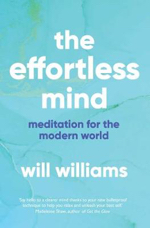by Will Williams
Being a writer tends to involve lots of deadlines.
Generally speaking, they are a helpful part of the creative process. In fact, many books may have remained unfinished without them.
Yet no matter how necessary they may be, looming deadlines can be difficult. Knowing that the clock is ticking and that we only have a limited time to pull a cherished idea from our imagination and into the real world can be a daunting prospect.
Once I Started Writing, the Words Just Flowed
When my book proposal was accepted by a publisher a few years ago, I was hugely excited. Becoming a published author is not something I imagined would ever happen to me, but after years traveling the globe training as a meditation teacher—and going on to teach hundreds of students—the desire to share what I had learned compelled me to draft a proposal.
If I’m honest, once I got to the moment where I could actually write the book, I thought the hard part was over. I had given myself the task of pitching a book about meditation that wasn’t a how-to guide, which turned out to be a challenge I wasn’t sure it would be possible to overcome. From there, defining the structure was an unexpectedly knotty undertaking, so it was a relief to actually get writing—and gratifyingly, the words just flowed.
With the Deadline Around the Corner, the Time Pressure Felt Immense
This isn’t one of those irritating “and then everything just went brilliantly” stories, however. While it’s no fun at all to see the days and weeks tick by as you struggle to finish one chapter, when you feel very much in the zone you can end up with an excess of material—which is exactly what happened to me.
With the deadline just around the corner and the dawning realization that I needed to cut 40,000 words from a book that had grown into a monster, the time pressure suddenly felt immense.
In the end, I went through my book twenty-two times in re-writes and edits, and just when I thought everything had been tied up, my publisher gave me seventy-two hours to find 267 references that (rather unwisely, in retrospect) I hadn’t noted down. Cue three sleepless nights tracking down data!
4 Ways to Stay Calm As Your Deadline Approaches
It was, undeniably, very hard work, and if I had been in this situation back in my burn-the-candle-at-both-ends, insomnia-plagued and stress addicted mid-twenties, I probably would have had something of a meltdown. Luckily, learning how to meditate and look after myself meant that staying calm when my deadline was looming a far more achievable prospect.
In my years as a meditation teacher and through the experience of writing my first book, I picked up a few, easy-to-do tips for staying happy and healthy even in very pressured circumstances. Here’s how you can keep anxiety and stress at bay in the last weeks before a deadline.
1. Use Simple Self-Care Tools
Even if you feel as if there isn’t a second to spare, jumping in the shower and brushing your teeth will only take ten minutes and can give you a sense of perspective. Nothing will fall apart if you give yourself a little time for rest and relaxation, and doing so will help you focus when you are actually working. Other small actions that will help you feel better include:
- Meditation. Just twenty minutes of meditation a day can give you some much-needed time out from the relentless nature of writing to a deadline. MRI scans suggest that 8-weeks of meditation are associated with positive brain changes, increasing grey matter in the areas of the brain associated with memory and higher cognitive function, while decreasing volume in the amygdala, the part of the brain associated with stress and fear (1). It’s also great for boosting confidence, which can be very helpful during any last-minute wobbles!
- Exercise. The benefits of exercise for our mental health have been well documented. (2) While committing to an exercise regime when a deadline is looming may be an unrealistic prospect, even one minute of skipping or a ten-minute yoga flow can make a big difference to your stress levels.
- Eating well. While you can probably afford to indulge in a take-out once in a while, eating well is an easy and effective way to stay happy and healthy while under pressure. High-sugar and high-fat foods have a negative impact on the vital function of neuroplasticity (3), as well as memory, learning, and cognition (4). A balanced, varied and thoughtful diet can boost your energy levels and fuel your efforts as your deadline approaches.
2. Work with Your Circadian Rhythms
Everyone has an internal body clock which tells them when to wake up, when they have the most energy and when they should go to sleep. Working with your circadian rhythms is an important part of improving your wellbeing and productivity, especially in a world where artificial light and our 24/7 culture can be so disruptive.
It’s not an issue whether you are an early bird or a night owl, just pay attention to the times in the day when you are naturally at your most alert and work with your body clock, rather than forcing it into a schedule that doesn’t suit you.
Some really important elements in this include getting as much natural light as possible (5), avoiding eating late at night and limiting caffeine to early in the day. While it may be necessary to spend a lot of time in the glow of a computer screen as you finish your book, any small concessions you can make—such as using a blue light filter on your screens, or not taking your laptop to bed with you—will have a positive impact.
3. Keep All-Nighters to a Minimum
In an ideal world, one where we are all perfectly organized and can plan for every eventuality, there would be no need to pull all-nighters. However, as my own experience can attest, sometimes that just isn’t the way things turn out. The important thing to remember is that all-nighters shouldn’t be part of your everyday schedule, but an emergency fall-back when you really don’t have any other option.
As we explored in the circadian rhythms section, you may be a bit of a night owl, and there’s nothing wrong with that as long as you are getting enough sleep and at least a bit of sunshine. A couple of all-nighters when absolutely necessary probably isn’t going to do any damage either, as long as you quickly get back to normal. The problem comes when you are existing on very limited sleep over an extended period of time—writing until 3:00 am before getting up early for a day job, for example.
I know it’s easier said than done when you are passionate about something and you have limited free time, but it’s very important to sleep properly, both for your productivity and your health. Just one week of limiting sleep to 4.5 hours a night has been shown to make people feel more stressed, angry, sad and mentally exhausted (6). Feeling tired (through lack of sleep or poor quality sleep) is also linked to the neurons in key temporal lobe brain cells firing more slowly and weakly (7).
Poor concentration and foggy thinking can mean those hours spent burning the midnight oil are often ones fraught with inefficiency and frustration, where even the strongest coffee can’t help you achieve true mental sharpness.
Getting the rest you need will not only protect your wellbeing, it will help you make the most of the time you have in your waking hours to finish your book. Whether it’s scribbling in your lunch break, typing through the evening or writing during your commute, try to write where you can but keep those 7 to 9 hours of sleep sacrosanct.
4. Utilize Your Support System
Leaning on those around you is nothing to feel guilty about (as long as you aren’t unreasonable), and it can do wonders to ensure you don’t neglect vital self-care through stress. You may arrange for another family member to drop your children off at school for a week, or ask your partner to temporarily take on dinner duty so you have something healthy to eat each evening. The smallest things can save you time and take some pressure off your shoulders.
Social support can help to protect you from the effects of stress, anxiety, and depression (8), and allow you to keep the worst feelings associated with completing a creative project at bay. Even just inviting your friend’s over for an hour or so can lift your mood and give you some perspective, especially if they are upbeat and optimistic. One study found that if a person had a happy friend living within a mile, that person was 25% more likely to be happy as well (9).
Perhaps the best thing about having a deadline around the corner is that, in a blink in an eye, it will be behind you, and you’ll have something to be proud of after all that hard work. Doing a few small things to protect your wellbeing will allow you to cope well with what is inevitably a stressful time, and come out of the other side with a book to your name.
* * *
 Will Williams is a meditation teacher and wellbeing advisor who founded the London meditation centre Beeja Meditation.
Will Williams is a meditation teacher and wellbeing advisor who founded the London meditation centre Beeja Meditation.
He works as a Program Director for One Giant Mind, a global charity dedicated to promoting all forms of meditation and researching their effects on individuals and society.
His first book, The Effortless Mind, was published with Simon and Schuster in 2018.
 The Effortless Mind: The Effortless Mind is meditation teacher Will Williams’s must-have guide for modern-day meditators.
The Effortless Mind: The Effortless Mind is meditation teacher Will Williams’s must-have guide for modern-day meditators.
Suffering from chronic stress and insomnia, Will undertook years of research and training with leading experts from around the world, and in The Effortless Mind Will explains how his Vedic-inspired method of meditation has transformed his life – and the lives of his students.
Their inspiring stories and the scientific research into meditation show the profound physical, mental and emotional benefits of this ancient technique.
Available at Amazon and Amazon UK.
Sources
Impact of Mindfulness-Based Stress Reduction training on intrinsic brain connectivity. Kilpatrick LA1, Suyenobu BY, Smith SR, Bueller JA, Goodman T, Creswell JD, Tillisch K, Mayer EA, Naliboff BD. (2011)
Exercise and well-being: a review of mental and physical health benefits associated with physical activity: Penedo, Frank Ja; Dahn, Jason Ra. (2005)
Palatable Hyper-Caloric Foods Impact on Neuronal Plasticity: Jean-Pascal Morin, Luis F. Rodríguez-Durán, Kioko Guzmán-Ramos, Claudia Perez-Cruz, Guillaume Ferreira, Sofia Diaz-Cintra and Gustavo Pacheco-López
Editorial: Impact of Diet on Learning, Memory, and Cognition: Amy C. Reichelt, R. Fred Westbrook, and Margaret J. Morris (2017)
Effect of Light on Human Circadian Physiology: Jeanne F. Duffy, M.B.A., Ph.D.a,* and Charles A. Czeisler, Ph.D., M.D.b (2010)
Dinges, D. et al., Cumulative Sleepiness, Mood Disturbance, and Psychomotor Vigilance Decrements During a Week of Sleep Restricted to 4 – 5 Hours Per Night, Sleep. 1997 Apr; 20 (4): 267–277.
Selective neuronal lapses precede human cognitive lapses following sleep deprivation: Yuval Nir, Thomas Andrillon, Amit Marmelshtein, Nanthia Suthana, Chiara Cirelli, Giulio Tononi & Itzhak Fried. (2017)
Cohen, S. (2004). Social relationships and health. American Psychologist, 674-84.
Fowler JH, Christakis NA. Dynamic spread of happiness in a large social network: longitudinal analysis over 20 years in the Framingham Heart Study.

